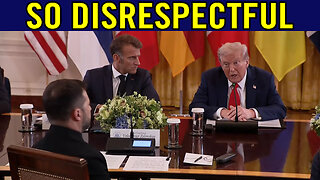Premium Only Content

Episode 1347: Response to Martin Luther by Thomas More - "Responsio ad Lutherum"
Sir Thomas More, not St. Thomas More, was an English lawyer, philosopher, and statesman who lived from 1478 to 1535. He is best known for his book "Utopia" and his role as Lord Chancellor of England under King Henry VIII.
Here are some of his notable works:
"Utopia" (1516): This is More's most famous work, a philosophical and political dialogue presenting an idealized society on an imaginary island. It critiques contemporary society and explores themes such as social justice, political philosophy, and the nature of happiness.
"A Dialogue of Comfort Against Tribulation" (1534): This work was written while More was imprisoned in the Tower of London. It offers consolation and advice to individuals facing adversity, drawing upon Christian theology and philosophy.
"The History of King Richard III" (unfinished): More began writing this historical work, which criticizes King Richard III, but he never completed it. The work was later used by William Shakespeare as a source for his play "Richard III."
"Responsio ad Lutherum" (1523): More wrote this Latin response to Martin Luther's criticisms of the Catholic Church. In it, More defends the Church's teachings and challenges Luther's ideas.
"The Apology" (1533): More wrote this defense of papal authority and his own refusal to recognize Henry VIII as the head of the Church of England. It was a response to accusations made against him by his opponents.
Although Utopia was his most famous book. I want to cover his book
"Responsio ad Lutherum" (Latin for "Response to Luther") is one of Sir Thomas More's notable works. It is a Latin text written in 1523 as a response to the criticisms of the Catholic Church made by the German reformer Martin Luther.
In "Responsio ad Lutherum," More defends the teachings and practices of the Catholic Church, presenting a systematic refutation of Luther's arguments. The book is structured as a point-by-point response to Luther's work "Assertio Septem Sacramentorum" ("Defense of the Seven Sacraments"), which defended the traditional Catholic understanding of the sacraments against Protestant reformers.
Here are some key aspects of More's defense:
Authority of the Church: More asserts the authority of the Catholic Church as the institution established by Christ, with the Pope as the successor of St. Peter. He argues that the Church has the divine mandate to interpret scripture and guide believers in matters of faith and morals. More emphasizes the importance of tradition alongside scripture, highlighting the Church's historical continuity and the wisdom of the early Church Fathers.
Here's more information on the authority of the Church:
Divine Authority:
Catholics believe that the authority of the Church derives from Jesus Christ, who entrusted his authority to the apostles and their successors. The Church sees itself as the continuation of the apostolic community, with the Pope as the successor of Peter and the bishops as the successors of the apostles. This authority is understood as a divine commission to guide and shepherd the faithful.
Teaching Authority (Magisterium):
The Magisterium refers to the teaching authority of the Catholic Church, which includes the Pope and the bishops in communion with him. The Magisterium has the responsibility to authentically interpret and preserve the deposit of faith, which includes both Scripture and Tradition.
The Magisterium's authority extends to matters of faith and morals, ensuring the faithful transmission of Christian doctrine. This authority is exercised through teachings, official documents, and pronouncements such as encyclicals, apostolic exhortations, and decrees.
Infallibility:
Infallibility is a specific charism of the Church's teaching authority. The Catholic Church believes that, under certain conditions, the Pope can exercise the gift of infallibility when solemnly defining a doctrine concerning faith and morals to be held by the whole Church. This means that such teachings are protected from error by the guidance of the Holy Spirit.
It is important to note that papal infallibility is limited to specific instances and does not mean that the Pope is infallible in all his actions or personal opinions. The infallible teachings of the Church are intended to provide certainty and guidance in matters of faith and morals.
Governance and Discipline:
The authority of the Church also extends to the governance and discipline of its members. Bishops have authority within their respective dioceses, overseeing the administration of the sacraments, pastoral care, and the spiritual well-being of the faithful. The Pope, as the visible head of the Church, exercises supreme authority over the entire Catholic Church.
The Church establishes laws, rules, and norms to guide the faithful and maintain order within the community. It has the authority to establish structures, appoint clergy, and regulate liturgical practices.
Sanctifying Authority:
The Church's authority extends to the administration of the sacraments, which are considered the principal means by which God's grace is communicated to believers. Through the sacraments, the Church mediates the grace of salvation and fosters the spiritual growth and sanctification of its members.
The Church also exercises authority in areas such as canonization of saints, granting indulgences, and promoting devotional practices, all of which aim to deepen the spiritual life of the faithful.
Overall, the authority of the Church in Catholic theology is understood as a divinely established institution entrusted with the task of preserving and transmitting the teachings of Jesus Christ. It encompasses the teaching authority, governance, and sanctifying power that guide and nurture the faithful in their journey of faith.
Sacraments: More defends the traditional Catholic understanding of the sacraments against Luther's criticisms. He argues that the sacraments are effective signs of grace instituted by Christ, conveying spiritual benefits to believers. More defends the sacrament of confession, the real presence of Christ in the Eucharist, and the sacrament of ordination, among others.
Here's more information on the sacraments:
Sacramental Nature:
Catholics believe that the sacraments are visible signs that communicate invisible graces. They are seen as encounters with the living God, conveying God's saving presence and bringing about spiritual transformation in the lives of the faithful.
Seven Sacraments:
The Catholic Church recognizes seven sacraments:
a. Baptism: The sacrament of initiation, by which a person becomes a member of the Christian community, receives the forgiveness of original sin, and is incorporated into the Church.
b. Confirmation: The sacrament that strengthens and completes the grace received at baptism, bestowing the gifts of the Holy Spirit and empowering the individual for a life of Christian witness and discipleship.
c. Eucharist: The sacrament in which the bread and wine are transformed into the body and blood of Christ, and believers partake in the real presence of Jesus, nourishing their souls and fostering unity with Christ and the Church.
d. Reconciliation (Confession): The sacrament of forgiveness, where individuals confess their sins to a priest, receive absolution, and experience God's mercy and reconciliation.
e. Anointing of the Sick: The sacrament administered to those who are seriously ill or nearing the end of life, providing spiritual strength, healing, and the forgiveness of sins.
f. Holy Orders: The sacrament through which bishops, priests, and deacons are ordained, conferring upon them the authority and grace to serve the Church and administer the sacraments.
g. Matrimony: The sacrament of marriage, in which a man and a woman enter into a lifelong covenant of love, unity, and openness to the gift of children.
Grace and Efficacy:
The sacraments are believed to convey grace, which is the free gift of God's life and presence. Each sacrament is understood to be effective by the power of Christ, who is present in and through the sacraments. The efficacy of the sacraments does not depend on the personal holiness of the minister but on the power of Christ working through the sacramental signs.
Sacramental Symbols and Rituals:
Each sacrament has specific rituals, words, and symbols associated with it. These signs and symbols are used to signify and convey the spiritual realities taking place within the sacraments. Examples include water and the Trinitarian formula in baptism, the laying on of hands in confirmation and ordination, and bread and wine in the Eucharist.
Sacraments of Initiation, Healing, and Service:
The sacraments are categorized into three groups: sacraments of initiation (baptism, confirmation, and Eucharist), sacraments of healing (reconciliation and anointing of the sick), and sacraments of service (holy orders and matrimony). These categories reflect the different dimensions of Christian life and the diverse ways in which God's grace is communicated.
Justification and Grace: More engages with Luther's concept of justification by faith alone. He emphasizes the Catholic belief in the cooperation of faith and works in the process of salvation. More argues that faith and works are inseparable, with works being the fruits of true faith. He defends the Catholic understanding of grace as transformative and transformative, not merely imputed righteousness.
Here's some further information about each of them:
Justification:
Justification is the act of God's grace by which a person is deemed righteous or justified in His sight. It is a central theme in Christian soteriology, which is the study of salvation.
In Catholic theology, justification is understood as a transformative process that involves God's grace working in the individual. It is initiated by God's unmerited favor or grace and is received through faith. The Catholic Church teaches that justification is not a one-time event but an ongoing process throughout a person's life.
Catholics believe that initial justification occurs at baptism, where a person receives the grace of justification, has their sins forgiven, and is incorporated into the body of Christ, the Church. This initial justification is not based on an individual's own merits or works but solely on God's grace.
Furthermore, Catholics believe that after baptism, individuals can grow in justification through the cooperation of faith and works. Good works, inspired by the grace of God, are seen as necessary responses to God's grace and are integral to the process of sanctification. Catholics emphasize that good works are not performed to earn or merit justification but are evidence of the transforming power of God's grace working within them.
Grace:
Grace, in Christian theology, refers to the undeserved favor and love of God freely given to humanity. It is the active presence of God's love and power that enables individuals to respond to God, grow in holiness, and ultimately attain salvation.
Catholics believe in two primary forms of grace: actual grace and sanctifying grace. Actual grace is God's assistance given to individuals in specific moments to help them make good choices and respond to God's will. Sanctifying grace, on the other hand, is the habitual grace that dwells within a person's soul, transforming them and making them holy. It is received at baptism and is increased through the sacraments, prayer, and a life of virtue.
Catholics also recognize the distinction between prevenient grace and cooperating grace. Prevenient grace is the grace that comes before any human response or cooperation, enabling individuals to respond to God's invitation. Cooperating grace, on the other hand, is the grace that works in conjunction with an individual's free will and cooperation, allowing them to actively participate in their own salvation.
Catholics emphasize that all graces ultimately come from God, and humans are wholly dependent on His grace for their salvation. Grace is seen as transformative, enabling individuals to grow in holiness, resist sin, and participate in the divine life.
Overall, justification and grace are intricately linked in Catholic theology. Justification is understood as a process of God's transforming grace, received through faith and manifested in a life of good works. Grace is the divine enablement that empowers individuals to respond to God's invitation, grow in holiness, and ultimately attain salvation.
Papal Authority: More defends the authority of the Pope as the successor of St. Peter and the visible head of the Church. He refutes Luther's arguments against the papacy, asserting that the Pope's authority is derived from Christ and that he serves as the final arbiter in matters of doctrine and discipline.
Here's some further information on the concept of papal authority:
Primacy of Peter:
The Catholic Church believes that Jesus Christ established Peter as the head of the apostles and the visible foundation of the Church. This belief is based on passages from the New Testament, such as Matthew 16:18-19, where Jesus gives Peter the keys of the kingdom and the power to bind and loose.
Catholics view Peter as the first Pope and consider the Pope as the successor of Peter, holding the same authority and responsibility. This belief forms the basis for the concept of papal primacy.
Universal Jurisdiction:
The Pope's authority extends universally over the entire Catholic Church. He is seen as the supreme authority in matters of faith, morals, and discipline. The Pope has the power to define and interpret doctrine, make decisions on matters of Church governance, and exercise jurisdiction over bishops and dioceses worldwide.
This universal jurisdiction is derived from the belief that the Pope is the successor of Peter, who was entrusted with the mission of shepherding the entire Church. The Pope's authority is understood as a ministry of service to the unity and well-being of the Church.
Infallibility:
In Catholic theology, the Pope is believed to possess the gift of infallibility under specific conditions. The dogma of papal infallibility, defined at the First Vatican Council in 1870, holds that the Pope is preserved from error when solemnly pronouncing on matters of faith and morals.
Papal infallibility is understood to be a charism, or gift, of the Holy Spirit that ensures the Pope's teaching on matters of faith and morals is free from error. It is exercised rarely and is associated with formal pronouncements made ex cathedra, that is, from the Chair of Peter, expressing a definitive teaching binding on all believers.
Magisterium:
The Pope exercises his authority in union with the College of Bishops, forming the Magisterium, which is the teaching authority of the Catholic Church. The Pope's authority is not independent of the bishops but is exercised in communion with them. The Pope, as the visible head of the Church, has the responsibility of preserving and safeguarding the deposit of faith and guiding the Church in matters of doctrine and discipline.
Petrine Ministry:
The Catholic Church views the Pope's authority as a ministry of service and unity, often referred to as the Petrine Ministry. The Pope is called to exercise his authority in a manner that serves the spiritual well-being of the faithful, promotes unity within the Church, and upholds the teachings and traditions of the apostles.
The Pope's authority is exercised through various means, including encyclicals, apostolic letters, and authoritative pronouncements. His leadership is seen as a unifying force that ensures the preservation and fidelity of Catholic doctrine and practice.
Indulgences and Purgatory: More addresses Luther's objections to the sale of indulgences and the doctrine of purgatory. He defends the Church's teaching on indulgences, explaining their purpose and proper use. More also defends the belief in purgatory as a state of purification and the possibility of prayers and Masses benefiting the souls in purgatory.
Here's some further information about each of them:
Indulgences:
Indulgences are a remission of the temporal punishment due to sins that have already been forgiven. According to Catholic doctrine, when a person sins, they not only damage their relationship with God but also incur a temporal punishment that must be satisfied either in this life or in the afterlife.
The concept of indulgences developed as a way to help people address this temporal punishment. It is believed that the Church, through the power of the keys given to Peter by Jesus, has the authority to grant indulgences. By performing specific acts of devotion, such as prayer, acts of charity, or participating in specific religious practices, individuals can seek indulgences.
The purpose of indulgences is not to "buy" forgiveness or salvation but rather to provide spiritual assistance and an opportunity for individuals to grow in holiness. The Catholic Church teaches that indulgences are not a replacement for genuine contrition, repentance, and the sacrament of confession but can help in the process of spiritual healing.
Purgatory:
Purgatory is a state or condition in the afterlife where souls undergo purification before entering into the fullness of heaven. It is believed that even if a person dies in a state of grace, they may still have attachment to venial sins or the consequences of forgiven mortal sins.
According to Catholic teaching, those who die with venial sins or temporal punishment remaining go to purgatory. Purgatory is seen as a state of temporary suffering, but it is also a state of hope, as those in purgatory are assured of their ultimate entrance into heaven.
The duration of purification in purgatory is not defined, and it is believed to vary for different individuals. The suffering in purgatory is understood as a purifying fire that cleanses the soul and removes the remaining effects of sin, allowing the soul to attain perfect holiness and union with God.
The Catholic Church encourages prayers, Masses, and acts of charity on behalf of the souls in purgatory. It is believed that these acts can alleviate the temporal punishment and assist the souls in their journey towards heaven.
Throughout "Responsio ad Lutherum," More employs a combination of scriptural references, theological reasoning, appeals to tradition, and historical examples to counter Luther's arguments. He presents a coherent and comprehensive defense of the teachings and practices of the Catholic Church, seeking to refute Luther's criticisms and reaffirm the Church's authority and authenticity.
More's work demonstrates his deep knowledge of theology, his skill in logical argumentation, and his commitment to upholding the integrity of the Catholic faith in the face of the Protestant Reformation.
More's response to Luther is comprehensive and covers a wide range of theological and doctrinal issues.
He addresses topics such as the authority of the Pope, the role of tradition in interpreting scripture, the nature of grace, the sacraments, the priesthood, and the relationship between faith and works.
Here's some further information on the role of tradition in the Catholic Church's understanding of Scripture:
Scripture and Tradition:
The Catholic Church views Scripture and Tradition as two interrelated sources of divine revelation. Both are considered important and necessary for a comprehensive understanding of God's message to humanity. The Church teaches that Scripture and Tradition are mutually supportive and complementary, with neither being superior or contradictory to the other.
Apostolic Tradition:
The Catholic Church places particular emphasis on apostolic tradition, which refers to the teachings, practices, and beliefs that have been passed down from the apostles to successive generations of believers. This tradition encompasses the oral teachings of Jesus and the apostles, as well as the teachings and practices that developed within the early Christian communities.
The Catholic Church believes that the apostolic tradition is guided and protected by the Holy Spirit, ensuring the faithful transmission of the authentic teachings of Christ. The deposit of faith, consisting of Scripture and Tradition, is seen as a unified and continuous source of divine revelation.
Interpretation of Scripture:
The Catholic Church recognizes that Scripture, being inspired by God, requires careful interpretation to understand its intended meaning. The role of tradition in interpreting Scripture is to provide an authoritative framework that helps guide and inform the reading and understanding of the biblical texts.
Tradition, as passed down through the Church, provides important insights into the historical, cultural, and theological contexts in which the biblical texts were written. It offers guidance on understanding the intended meaning of the biblical authors, particularly when it comes to matters of faith, morals, and doctrinal teachings.
The Magisterium, which is the teaching authority of the Catholic Church vested in the Pope and the bishops, plays a significant role in interpreting Scripture within the framework of tradition. The Magisterium has the authority to authoritatively teach and interpret the Word of God, ensuring the faithful understanding and application of Scripture in light of the apostolic tradition.
Development of Doctrine:
Tradition also plays a role in the development of doctrine within the Catholic Church. As the Church encounters new challenges, questions, and cultural contexts, the guidance of tradition helps provide a foundation for the development of doctrine that remains consistent with the teachings of Christ and the apostles.
The Catholic Church believes that the Holy Spirit continues to guide and unfold the understanding of divine revelation within the context of tradition, allowing for a dynamic and organic development of doctrine while maintaining continuity with the apostolic faith.
In summary, tradition in Catholic theology serves as a crucial guide in interpreting Scripture. It provides a rich source of insights, teachings, and practices that have been passed down from the apostles, guiding the Church in understanding the intended meaning of Scripture and ensuring the faithful transmission of divine revelation.
One of More's primary concerns in "Responsio ad Lutherum" is to emphasize the unity and continuity of the Catholic Church throughout history. He argues that the Church founded by Christ has remained true to its teachings and that the authority of the Pope is derived from the apostolic succession.
More also engages with Luther's criticisms of certain practices of the Church, such as indulgences and the veneration of saints. He provides explanations and justifications for these practices, seeking to defend them against Luther's objections.
The style of "Responsio ad Lutherum" is scholarly and argumentative, reflecting More's intellectual prowess and his deep knowledge of theology and Church history. It demonstrates his commitment to defending the Catholic faith against the emerging Protestant movement and his skill in articulating complex theological ideas.
Overall, "Responsio ad Lutherum" is an important work in the context of the Reformation, as it represents one of the Catholic Church's most prominent responses to Luther's criticisms. It showcases More's theological acumen and his unwavering dedication to the Catholic Church.
-
 LIVE
LIVE
The Bubba Army
20 hours agoImmigrant Truck Driver.. Who's To Blame?! - Bubba the Love Sponge® Show | 8/20/25
11,254 watching -
 25:57
25:57
DeVory Darkins
1 day ago $10.87 earnedNewsom suffers HUMILIATING SETBACK after FATAL Accident as Trump leads HISTORIC meeting
25K111 -
 LIVE
LIVE
FyrBorne
10 hours ago🔴Warzone M&K Sniping: First Impressions of Black Ops 7 Reveal
489 watching -
 8:16
8:16
MattMorseTV
15 hours ago $7.76 earnedTrump’s name just got CLEARED.
63.4K60 -
 2:01:55
2:01:55
MG Show
19 hours agoPresident Trump Multilateral Meeting with European Leaders; Trump Outlines Putin Zelenskyy Meeting
17K19 -
 LIVE
LIVE
DoldrumDan
1 hour agoCHALLENGE RUNNER BOUT DONE WITH ELDEN RING NIGHTREIGN STORY MODE HUGE GAMING
41 watching -
 10:59
10:59
itsSeanDaniel
1 day agoEuropean Leaders INSTANTLY REGRET Disrespecting Trump
12.1K14 -
 16:43
16:43
GritsGG
15 hours agoThey Buffed This AR & It Slaps! Warzone Loadout!
12.3K1 -
 2:05:30
2:05:30
Side Scrollers Podcast
19 hours agoEveryone Hates MrBeast + FBI Spends $140k on Pokemon + All Todays News | Side Scrollers Live
106K11 -
 11:06
11:06
The Pascal Show
14 hours ago $1.32 earned'THEY'RE GETTING DEATH THREATS!' Jake Haro's Lawyer Breaks Silence On Emmanuel Haro's Disappearance!
14K